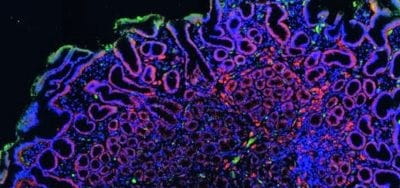
Krishna M. Roskin, PhD
- Assistant Professor, UC Department of Pediatrics
About
Biography
With the sequencing of human genome nearing completion, there was a lot of interest in applying comparative genomics approaches to help unlock the secrets of the human genome. Dr. Roskin worked with David Haussler as part of the Mouse Genome Sequencing Consortium. Their goal was to analyze the genomic differences between mammalian species to find regions of the human genome that are conserved not by chance but because of evolutionary constraint. To that pairwise analysis, Dr. Roskin added data from the Rat Genome Sequencing Consortium to allow triangulation of evolutionary events across the whole genome.
A major result in the Mouse genome paper was Dr. Roskin's estimate of the share of the human genome under purifying selection. He developed score functions to detect unusually conserved regions in the human genome by comparing it to the mouse. By looking at the distribution of conservation scores genome-wide compared to the scores of regions under neutral section, he estimated that 5% of human genome is under purifying selection. This percentage is much higher than the fraction of the genome that codes for proteins and spurred new interest in function non-coding elements of the human genome.
BA: Mathematics, University of California, Santa Cruz, CA,
BS: Computer Science, University of California, Santa Cruz, CA,
PhD: Computer Science, University of California, Santa Cruz, CA,
Interests
Translational medicine: immunodeficiencies; autoimmunity
Interests
Computational immunology: antibody and TCR sequence analysis
Bioinformatics: large-scale biological data systems; reproducible science.
Research Areas
Publications
High-fat diet induces systemic B-cell repertoire changes associated with insulin resistance. Mucosal Immunology. 2017; 10(6):1468-1479.
Defining antigen-specific plasmablast and memory B cell subsets in human blood after viral infection or vaccination. Nature Immunology. 2016; 17(10):1226-1234.
Single B-cell deconvolution of peanut-specific antibody responses in allergic patients. Journal of Allergy and Clinical Immunology. 2016; 137(1):157-167.
The mouse antibody heavy chain repertoire is germline-focused and highly variable between inbred strains. Philosophical Transactions of the Royal Society of London. Biological Sciences. 2015; 370(1676).
IgH sequences in common variable immune deficiency reveal altered B cell development and selection. Science Translational Medicine. 2015; 7(302):302ra135.
B-cell repertoire responses to varicella-zoster vaccination in human identical twins. Proceedings of the National Academy of Sciences of the United States of America. 2015; 112(2):500-505.
Human responses to influenza vaccination show seroconversion signatures and convergent antibody rearrangements. Cell Host and Microbe. 2014; 16(1):105-114.
Effects of aging, cytomegalovirus infection, and EBV infection on human B cell repertoires. Journal of Immunology. 2014; 192(2):603-611.
Convergent antibody signatures in human dengue. Cell Host and Microbe. 2013; 13(6):691-700.
Co-evolution of a broadly neutralizing HIV-1 antibody and founder virus. Nature. 2013; 496(7446):469-476.
From the Blog
Why Having a Dog Can Help Reduce Food Allergy Reactions
Krishna M. Roskin, PhD11/12/2025
Scientists Discover a Peanut Allergy ‘Fingerprint’ That May Help Push Emerging Treatment to New Levels
Krishna M. Roskin, PhD3/9/2020
Broad Immune Response to HIV Linked to Development of B Cells
Krishna M. Roskin, PhD1/22/2020






